Tagged: life
Life Update: Burgers, Tattoos, Cars + VR
- by Alyson Shane
One of the downsides of being a busy business owner is that I don't often get the opportunity to share what I've been up to on a personal level. I'm working on big biz-related surprises which will hopefully help me find more blogger balance (more on that soon!) but in the meantime, here's what I've been up to in the few weeks since I've been back from my trip:

Burgers & Cars
A few weeks ago I had the opportunity to test drive a Lincoln MKX, which is classified as a "luxury crossover vehicle" and is by far the fanciest vehicle I've ever been in. As someone who's spent most of her time in Neons, Vibes, and Swifts (aka, not your mom and pop kinda van) it was a pretty great experience, especially because I don't have a car day-to-day.
With that in mind John and I decided to take the Lenore Street Squad (aka our roommate, Alex and his girlfriend Katrina) on a Manitoba-based day date to try and suss out where we could find the best rural burgers (also because while going to IKEA and cramming the trunk full of stuff is exciting for me, I'm sure you guys could care less about my amazing new lamp, but anyway).

We hit up Trails North Grill, which is a super-charming burger joint located in Warren, MB. We gorged on fried pickles, salad, and (of course) burgers. I'm glad I wasn't driving on the way back because I was officially in a food coma.
Honestly it was also really nice to just get out of the city; I don't often have the chance to get to know my province a bit better, and even though some Silent Hill-esque mist descended upon us for part of the drive, it was still a ton of fun and a great way to spend some time with some of my favourite people.
Tattoos
Tomorrow I'm going under the needle and getting my first-ever tattoo!
While this is obviously a super-exciting event for me, it's also been a very long time coming. The tattoo I've chosen (it's script, actually) is meant to represent where I've come from: from a sad, unhappy and deeply depressed person to someone who does her best to take chances, challenge myself, and who works to make healthy, happy decisions instead of getting dragged back into the mire caused by unhappy and dramatic people.
When I first met with Katie from Metamorphosis for my consultation she told me that she doesn't usually do script tattoos, and as a rule doesn't do them for first-timers like me. However, after explaining my reasoning behind it, and how deeply personal the quote is, she not only agreed to design it for me, but she also told me that it was one of the best script-based tattoo ideas she'd seen in a long time!
What am I getting? Well, you'll just have to check back here and find out once it's all healed up! (Or follow me on Instagram, where I'll likely be sharing it first).
VR
Aka virtual reality!
A few weeks ago John and I spent a few days playing around in virtual reality as part of the trailer shoot for the HTC Vive game Fantastic Contraption and had an utter blast.

(Yes I'm every bit as excited as I look!)
The goal of the game is to create "contraptions" within a virtual space and send them rolling towards a goal while avoiding obstacles, staying balanced, and not rolling right off of the edge of the floating island you're standing on. The game is insanely fun and I'm really, really looking forward to playing it again soon.
Here's a little more about the game (featuring older trailer footage):
The coolest part about the shoot was that, since it was shot on a green screen background, the VR world that the player can see inside the headset can be stitched in to replace the physical world. This allows people watching the trailer to actually see what we saw, and experience the game in the same VR world that we did.
I definitely need to give a huge shout-out to the super-talented Kert Gartner for including us. I'm so excited to see the project when it's finished (and am always available for any future VR-related projects, hehe).
In My Community: Speaking to Red River College's Creative Communication Students
- by Alyson Shane
Earlier today I had the pleasure of speaking to students in their first year of the Red River College's Creative Communications program (aka #CreComm) about the state of social media, blogging, and the future of digital communication with my longtime internet pal Liz Hover.

(Really digging my Neil DeGrase Tyson hands in the bottom left, by the way)
This is actually my fifth year returning to speak to students in the program (my first time was in 2011 - how time flies!) and every year it gets better; not just because I get to see new faces and have brand new discussions, but because as my life has changed I've become better suited to be able to speak on these topics, going from a university student, to a university graduate, to being employed full-time and finally to running a business where I literally blog and do social media all day.
As usual, we didn't have enough time to cover everything that I wanted to speak about, so I wanted to cover a few topics that didn't really wrap up during my time with the students today.

Merging My Personal Brand & Business
I started off as a lifestyle blogger in 2003, back on LiveJournal, and spent a number of years blogging rather aimlessly and not with a lot of purpose. I blogged frequently, sure, but it was usually just about what I'd done on the weekend, or a video I liked, or whatever.
What I had at the time was a strong personal brand, but as I started to think more critically about my craft I wanted to write about my weekends less and less, and about social media, content marketing, and being a business owner more and more.
Blogging for my business gives my blog a sense of purpose, and has provided me with a theme to tie together a lot of topics and ideas which would have seemed weird to write about as a lifestyle blogger.
During our talk Liz turned to me and said "I like your blog now; you seem a lot more happy and positive" and that's because I am. My lifestyle blog chronicled a time in my life where I was largely unhappy and trying to figure myself out, and as I've grown, learned, and gained happiness and confidence as a result of running my business it's translated into what I write here on my blog.
It's totally okay (and normal, and expected) that your blog will change and grow as you do over time - that's okay! We're in a constant state of self-discovery, and our blogs and websites should be a reflection of that.
On Having Anxiety & Being Open About It
One of the things that we touched on in the class, and which several students asked me about afterward, was how I dealt with being an anxious person, and what led me to decide to share some of my personal struggles with my audience when some of them could be potential clients.
I first wrote publicly about my issues with anxiety for Bell Lets Talk Day in 2015. The post is called Living With the Mean Reds and it was one of the most popular posts I've ever written. Since then I've blogged about my progress, which apps I've used to help manage it, and even written about my falling-out with my family, and creating a family of choice to move forward in positive and constructive ways.
None of it is easy to write about, and one of my other family members cautioned me that writing about this side of my life may actually alienate potential employers or clients. My response to that is: if having anxiety or issues with my family stops someone from wanting to work with me, then we wouldn't have been a great fit anyway.
I'm going to do what I want and the kinds of people who respect and appreciate what I have to say will find me and want to work with me. It's worked out great so far.
Besides that, as our digital world becomes less and less private, the onus is on us as individuals to take the time to craft the narratives we want about ourselves online. Sure, you can't control what other people say (remember The Dirty? Omg) but going out of your way to craft your own narrative is an important part of creating your personal brand because even though we like to paint pretty pictures of ourselves online we all know deep down that there are hard times and dark days, and part of being an authentic and relatable human being is being honest with yourself and your audience about your struggles, even if that's challenging sometimes.
What If Blogging Isn't Your Thing?
Creative Communications students have to blog as part of their curriculum, and during our talk we touched on the fact that - let's face it - blogging may not be for everybody. Which I agree with; writing isn't easy for some people.

However, I do think that it's important that young people who are entering job markets which require them to be creative (eg: digital marketing, advertising, public relations, etc) should make a point to find a way to express themselves creatively online in a way that they can point to in an interview and say "this is mine."
Blogs also don't have to last forever. My good friend Luke is running year24.com a blog about (you guessed it) his 24th year. This project is on the easy side because he set the parameters himself, and there's a concrete start and end date. What matters is that he made a decision to do something creative and challenging, and was successful in doing so.
But maybe you really hate blogging for yourself, and the idea of holding a camera not attached to your iPhone scares the living daylights out of you. What can you do?
There are a variety of things: start a killer Instagram account about your pet like Liz did; reach out to publications online and start writing for them (one of the very first places I was published online was The Spill Magazine, for example); start interviewing local business owners that you admire and compile them on a website; create and grow a killer Pinterest community; you get the drift.
What matters is that you demonstrate that you're constantly learning, looking for new challenges and opportunities, and can present what you know in a fun and accessible way. The sky is really the limit!
Want More?
Do you have questions about blogging, social media, or how the heck I got to where I am?
Are you a teacher interested in having me visit your class to speak about blogging, social media and digital marketing to your students?
Drop me a line! I'm always happy to have a quick email exchange, a lunchtime chat, or even an after-hours pint at the Yellow Dog. Looking forward to hearing from you!
*As always, thanks to Kenton Larson at Red River College for having me!
How to Take a Real Vacation While Running Your Own Business
- by Alyson Shane
With my Central American vacation extravaganza coming up tomorrow (gulp!) , I've been experiencing a higher than usual degree of anxiety around my business. This will be the first time that I'll really be "away" from my work in any real capacity, and I'm starting to realize why only 9% of the 200 business owners interviewed in a survey by OnDeck allowed themselves to take a full two-week vacatio.
This is really distressing news! Relaxing and taking a break is crucial to being productive and happy, and it provides much-needed downtime away from all the screens and stresses of everyday life. Even better, with recent advances in technology business owners can work from virtually anywhere, meaning that they can check in and give themselves peace of mind that their hard work isn't crumbling to pieces while they're on the beach.
However, in order to go away on a vacation and not lose your mind, there are a few steps that you can take to help alleviate anxiety and keep things running properly while you're away. Here are some which have helped me:

1. Have someone you trust step in for you
If you manage a business with a few employees, then speak to one of them about handling some of your more pressing duties. Having someone that you trust, whom you know can handle themselves in a crisis and won't burn your business to the (figurative) ground will go a long way towards making sure you aren't stressing out the entire time you're gone.
In my case, I'm getting someone I trust to handle my client's accounts while I'm away. I've planned out as much content in advance as I can, and made my clients aware of a very strict cutoff date for info pertaining to pressing ads and marketing campaigns, so that way all that person has to do is a bit of community management (ie: replying to Tweets and comments as needed).
2. Communicate your expectations
If you run a service-based business like I do, communication is key. This is great day-to-day advice, but is especially applicable when you're about to go away on vacation. Keeping your clients or customers in the loop goes a long way towards building trusting relationships, and helps set their expectations as to what you can reasonably do while you're away.
To illustrate: last week after the holidays ended I sent all of my clients an email with a friendly post-holiday message, and a reminder that I'm going out of town. Now they know the exact dates I'm leaving and returning, as well as the final submission date for any content they need created or scheduled. I also asked them to think of any upcoming events or promotional opportunities, and to let me know ASAP so I that I can plan ahead to make sure nothing gets missed.
I also let them know that, while I will be checking my email from time to time, I'll be in the jungles (or beaches!) of Central America and have no idea what the wifi will be like, so it may take me a few days to respond. By communicating expectations in advance, both parties know what to expect.
If you have employees, make them aware of what you expect them to do while you're away. Having a checklist or defined list of tasks and goals can go a long way towards helping them stay motivated in your absence, and defines clear expectations so there's no confusion.
3. Set boundaries
The point of a vacation is to peel yourself away from your screen.
As someone who literally makes their living online, I know that I'm going to struggle to not keep my face buried in my iPhone screen the entire time, and honestly this is giving me some anxiety.
I'm lucky that a lot of the places we're going will probably have pretty slow, spotty wifi, which will help force me off my phone, but if you're going somewhere with a strong connection, like a resort or somewhere that isn't in the middle of the Guatemalan jungle, then setting rules like "I only check my email in the morning over coffee" can go a long way to keeping you sane.
Not just that, but having a rule for when you "check in" can also help your clients and employees (if you have them) know when to expect to hear from you, and when the best time to get in touch with you will be.
4. Use collaboration tools & group chats
There are a variety of collaboration tools online such as Slack, Asana, Evernote, BaseCamp, and Trello (my personal fave) which you can use to stay in the loop about various projects and opportunities. By making the most of these tools you can communicate and catch up with your team or clients quickly and effectively, leaving more time to hang out and relax.
In the event of a crisis, tools like Google Hangouts and Skype are great for having a quick chat to solve the problem. This can work great for employees who are stressed out during a crisis, or a client who is having a meltdown while you're on another continent.
How do you keep from going crazy when you go away on vacation? Tell me in the comments!
3 Things to do Before Breaking Out on Your Own
- by Alyson Shane
Well, I made it.
It's 2016, my business hasn't fallen apart, and my life didn't somehow implode in on itself. Yay!
Without a doubt, starting my own business and making the transition from being a full-time employee to a full-time business owner was scary as hell. There isn't really a "right" way to make the jump, and there aren't really a specific set of steps that you absolutely 100% must take in order to do it. However, there are a few key things to keep in mind before you break out on your own, which I want to discuss in this post.
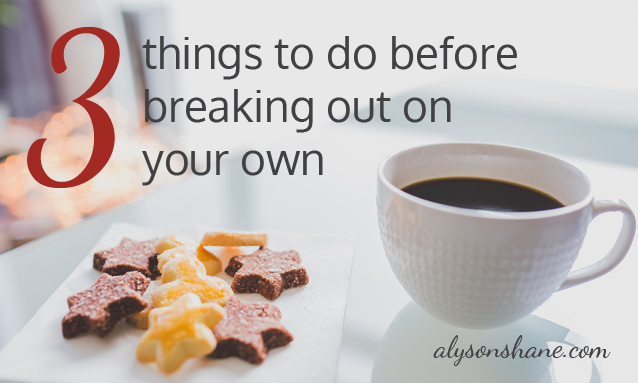
Why do I want to talk about this stuff? Because sharing is caring, and because I was lucky enough to have a wonderful and very clever guide (my boyfriend, John) who helped me navigate a lot of hurdles and helped me prepare for this experience.
Not everyone starting their own business is fortunate enough to have a John in their life, so here are a few things he taught me which I think will help you out if you think that running your own business is the path that you want to take:
1. Start Hustling Early
I got my first client a full year before I started working for myself full-time. Honestly, it happened by accident (I met a guy I knew from Twitter at a party who introduced me to his friend who needed a copywriter) and it wasn't for much, just a few copywriting articles each month. It didn't make a lot of money off that first client, but the experience of working with someone for a while helped me start to understand the dynamic of different kinds of working relationships which were different than the boss/employee relationship I was used to.
Also, starting small has allowed me to scale my business in a manageable way. I've acquired a handful of regular clients who I work with on a monthly basis, as well as some copywriting work, and one-off contracts for special events or websites as they come up.
I should also point out that I have been extremely lucky. What happened to me isn't always the case, and it's not realistic to assume that just because you go into business for yourself, that clients will start pouring out of the woodwork right away.
Not just that, but securing an ongoing contract (if that's what you're looking for, some businesses operate on a per-contract basis) often takes time. The process from the initial email or meeting to signing a contract can take months to happen, or never materialize at all.
By starting to build a client base early, you can get a feel for whether or not running your own business is actually what you want to do before you jump feet-first into doing it. Also, leaving your secure 9-5 knowing that you already have a handful of contracts to take care of your living expenses goes a long way in helping make the transition less scary. Trust me on this one.
2. Buckle Down
Assuming that you're working a 9-5 job in addition to building your business, you're going to be insanely busy trying to juggle both before breaking out on your own. Get used to it.

Before I left my office job I was working most weeknight evenings from 6-11 or 12, and spending a lot of time working on the weekends, as well. If you're trying to build up a decent client base to help you make a smooth transition, then obviously any time spent doing that work needs to be done outside of regular office hours (unless your boss is cool with this, which most aren't.)
If you want to work for yourself, you need to get ready for a very imbalanced work/life lifestyle for a while. Not just before you leave your 9-5, but afterward, too. To illustrate: I'm writing this on a Sunday evening, after working all day since I got up. I've also been on "holiday" since Christmas Eve, but have spent at least 5 days of my 10-day 'holiday' working for the majority of the day (who told you that running your own business was glamorous?)
What's crazy is that what I just illustrated isn't that uncommon; lots of people I know work even more than I do! But when you run your own business you're the only person responsible for generating your own income, and the sooner you get used to working aggressive and unusual hours, the better.
3. Save Up
Without a doubt the most terrifying thing about working for yourself is the transition from going to having a regular paycheque which is deposited into your bank account every two weeks, to one where your financial situation is in a state of flux.
I try not to talk too much about my financial situation, but in the interest of learning from my experience, here's how I managed to get myself into a relatively good position:
When I got my first contract (the small copywriting one I mentioned earlier) I used it to start paying down my credit card debt and the student debt that I'd acquired while in university. As I picked up more clients and started to think more seriously about running my own business as an option, I started splitting my additional income (ie: the money I was making above what I was paid at my office job) between paying down my debt and putting it aside in a nest egg.
Having a nest egg allows me to not freak the hell out when a payment is late (which happens) because I still have a float to live on for a while. Honestly, this "float" is the key to running your own business and not being in a constant state of panic. This all changes when you start bringing subcontractors and employees into the mix, of course, because they have to be paid before you do, but that's a whole different kettle of fish (and anxiety) that we won't go into here.
One last thing about money: get your taxes in order. If you live in Canada and you run a business making over $30,000/yr you must register for a General Sales Tax (GST) number. Dealing with the Canada Revenue Agency is a hassle (believe me) but if you aren't filing your taxes correctly you can wind up owing tens of thousands of dollars. Speak to your bank or accountant, if you've got one, and make sure you're covered.
Do you have any tips for people thinking about breaking out on their own? Tell me in the comments!
5 Things to Let Go of in 2016
- by Alyson Shane
Okay, I know how cheesy these posts are, but bear with me!
I've had a transformational 2015: I started running my business full-time; I started a second business (more on that soon!); I was awarded a TechFutures Grant; I met so many amazing people and had experiences that the Alyson of 2014 wouldn't have had the guts or ambition to go after.
I also know that there will be tough years ahead, sometime in the nebulous, unknown future, which is why it's important to reflect and consider the things to improve on, and the things to let go of.
With that in mind, I'd like to share my reflections some of this stuff with you guys:

1. Let go of everyone's opinions of your life
There are always going to be people who are going to give you their opinion of how you should be living your life, and that's okay. However, you need to keep in mind that there's no one "right" way to live, and that happiness can mean a variety of things for a variety of people.
Unfortunately this means that you can't please everyone. Your definition of a successful and happy life may be drastically different than someone else's, and they may not be afraid to loudly tell you so. This can get discouraging, and in my experience often leads to self-doubt, and in extreme cases to indecision and stagnation instead of progress. This is because when you spend all your time defending your decisions to other people, you stop focusing on making the best choices.
Ask yourself: what kind of life do you want to have? Do you want a traditional 9-5 with a cute house and a lovely spouse? Do you want to jet set across the globe, live in hostels and take a series of lovers? Maybe you want to do something else - that's okay! What matters is defining what your ideal lifestyle looks like, and then taking steps to achieve it, no matter what anyone else thinks.
2. Let go of your comfort zone
A few weeks ago I spent the day at InnovateMB's Pitch'Day workshop and - full disclosure - initially I did not want to go. Not because I didn't think the workshop wouldn't be super-helpful (and it was!) it's because the idea of having to sit by myself in a room full of my peers and present, discuss, and analyze my business idea scared the living daylights out of me.
However, after a cup of coffee I pretty quickly found a better attitude and wound up learning a ton - way more than if I had held on to my discomfort. Instead, I made a point to actively participate, ask questions from the presenter and engage as much as possible, and I wound up having an excellent time!
Not just that, but pushing myself that way felt good. Even when I got something wrong, or made a mistake, I could let myself off the hook because at least I got over myself (and my fear of being wrong) and made an effort.
This is of course easier than done in a lot of cases, but taking baby steps like asking a question, going out to a meetup where you don't know anyone, or even taking yourself out for lunch can make a huge difference in how you feel about yourself!
3. Let go of 'Zero Days'
I read a great post on Reddit yesterday which discussed being motivated and staying positive, and one of the things they mentioned was not allowing yourself to have 'Zero Days'. A Zero Day, according to /u/ryans01, is "[a] day is when you don't do a single fucking thing towards whatever dream or goal or want or whatever that you got going on."
Look, I hear you: "Alyson, asking me to never take a day off is ridiculous!" Which is true. Good on you for recognizing that over-working yourself is counter-productive!
However, taking baby steps each day towards your goals is a totally within reach! Here are a few examples of things I do so that I don't have Zero Days:
- Write blog posts/sketch out content ideas
- Work on the Crowdfunding Crash Course eBook, Puffin Chat, and other side projects
- Read articles about my industry and the tech sector
- Queue up content for my/client's social feeds
- Go to the gym and work out
- Clean and listen to podcasts (I find a clean house helps me think & focus)
- Draw or doodle in my sketchbook
Notice that all of these things are pretty low-key and don't really seem that taxing, which is the beauty of it. All of these things, if done consistently over time, will help me work towards my goals (being creative, moving my business forward, staying in shape, working on my art, etc) and if I look at them as small things to do each day they feel a lot more manageable.
Full disclosure: I still have zero days. Usually they look like days where we lie around on the couch, order some SkiptheDishes (I'm hooked) and binge-watch a TV show (we just finished Jessica Jones - so good!) but they are few and far between, and are getting further and further apart.
4. Let go of the people who don't add value
This is the one of hardest things.
It's so easy to let people over-stay their welcomes in our lives. Whether it's an old lover who doesn't ignite your heart like they used to, or an old friend who doesn't zhuj up up your days, sometimes we let people who should have parted ways with us stay around too long. Sometimes (too often) we even fight to keep them in our lives because they've become familiar and comfortable.
But it's important to do our best to consistently re-evaluate the people we devote our time and energy to. Like the old adage goes, we are the sum-total the the five people we spend the most time with.
Ask yourself: how do I feel around these people? What do we talk about - are they generally negative, or positive topics? Do these people make me feel small and insecure, or unafraid and bold? These are important questions to ask on a regular basis, and if someone starts to fall into the negative category for too long, it's time to have a chat about it, and potentially move on.
5. Let go of the idea that you can't change things
You can always change. If there's anything that the past few years have taught me, it's that a few small changes, or a little bit of belief in yourself can make a world of difference.
The problem with looking towards the future is that the future feels overwhelming. So instead, try to take baby steps (see Zero Days above) which help you work towards your goals at a pace that feels comfortable. Here's a personal example:
When I was 21 worked a safe government accounting job, but I was unhappy and wanted to go to university. However, quitting my job was scary and I didn't know if it was the right choice. I hummed and hawed for weeks about what my next steps should be. I felt overwhelmed at the transition from full-time employee to full-time student, and how to get started. However, I knew how, deep down: I needed to call Student Central at the university and book an appointment to speak to someone about pursuing the degree I wanted.
It was so easy to find reasons not to call and speak to someone about applying: I went out on my lunch break and there was no time; I felt too busy and overwhelmed from my workday to deal with it; and, most commonly "I just don't feel like it today." One day, though, I picked up the phone and did it. I spoke to someone, got the information that I needed, and after I hung up the phone I distinctly remember saying to myself "wow, that was so much easier than I'd made it out to be."
Spoiler alert: most things are easier than we thought they'd be. It's just a matter of looking at things as small steps towards a larger goal, instead of huge, overwhelming obstacles. Chip away at it slowly and you can move a whole mountain, if you try!
What are you letting go of in 2016? Tell me in the comments!
Vingt-huit
- by Alyson Shane

The Good
Life is good.
I feel so thankful for my friends, the plethora of people who make me smile and touch my life in so many ways. Being able to watch the people I care about grow and create their futures is amazing to watch, and something that I feel fortunate to be able to share with them.
And for John, my partner through everything, who reminds me every day what it is to devote yourself to the things you love, and to always strive to do good, and to act with kindness and sincerity. I love him more than I can describe, and am so thankful for the time we have together.
The life I have now, where I get to wake up to my best friend every morning, spend my days doing work that I love, and experience the (slightly terrifying) adventure that is running a business, is one I wouldn't trade for anything in the world.
The Bad
Earlier this year, as part of my efforts to heal and grow, I asked my parents for some space while I started going to therapy. Their reaction was painful to accept: my mom simply didn't respond or acknowledge the email I wrote to her explaining how I felt, and my dad told me to "have a nice life." When confronted with a reality that they didn't like, they decided to gloss over it by simply not dealing with it and hoping it would go away.
I can't describe to you how awful it feels to have your parents disregard your feeling and experiences this way. It's devastating, and it hurts every time I think about it.
However, it was an eye-opening experience for me. I'd grown up believing that behaviour like this was commonplace and acceptable, but talking to a professional helped me understand that this isn't. It's not normal for parents to cut their children out, or punish them with a wall of silence when confronted with something that upsets them, or makes them uncomfortable.
I started realizing that a lot of the behaviours I was working to get rid of: anxiety attacks, crippling fear of failure, feeling like I'm never good enough, were largely the result of my relationship with my parents, and that their decision to cut me out entirely was a blessing in disguise. In the last ten months I've come to have a much deeper understanding of who I am, and what my values are, and what I want from my life than I've ever had before.
Sure, part of that is likely just a result of growing up and the normal maturing process, but not having to defend my actions constantly, or try to find love and approval that didn't come with strings and expectations attached, has made such a tremendous difference in my life.
I haven't talked about this too much because I don't want to air too much of my family's dirty laundry. However, I do feel obligated to touch on it and share it with you, because it's been an important part of my growing process, and because nobody, not even a family member, has the right to treat you badly.
The Incredible
Without a doubt, running my business full-time has been the biggest and most important change in the past year. Honestly, I'm still not used to it. There are days when I find myself walking around in the middle of the day, maybe on the way to a meeting, or doing some errands while the stores are empty, and think "I can do whatever I want today." That's pretty fucking empowering.
I like being one of those people who get excited to talk about work, and it's been an interesting transition to stop thinking of work as something taboo, or something I'd rather not think about or discuss outside of "regular working hours" to something that I love enough to talk about pretty much constantly.
Of course, it's not all roses and fat stacks; running your own business is scary. There's no guaranteed monthly salary, no pension plan, and no benefits. Everything I do, I have to do for myself. But having to depend on myself (and some advice from much-appreciated mentors and colleagues) has given me confidence and helped me discover so much about myself, and I wouldn't trade that for the world.
The Future
For the first time in my adult life I feel excited about what's to come.
This is new for me. For most of my life I felt directionless; unsure of what I wanted, where I'd go, what I would do with myself. I took jobs I didn't like, hung around with people I didn't much care for (and who didn't really care about me in return), and made decisions based on fear.
I was a scared, insecure, and anxious person.
These days I feel different. Sure, I still get anxious, or stressed, or have moments of doubt, but I've been learning to handle them a lot better, and those paralyzing moments are becoming fewer and farther between.
I truly feel like this was the year where I came into my own, and I'm so excited to see where I'm going to go.
As always, thank you for sharing this journey with me.
xox
yr girl Shaner
Having a Family of Choice
- by Alyson Shane
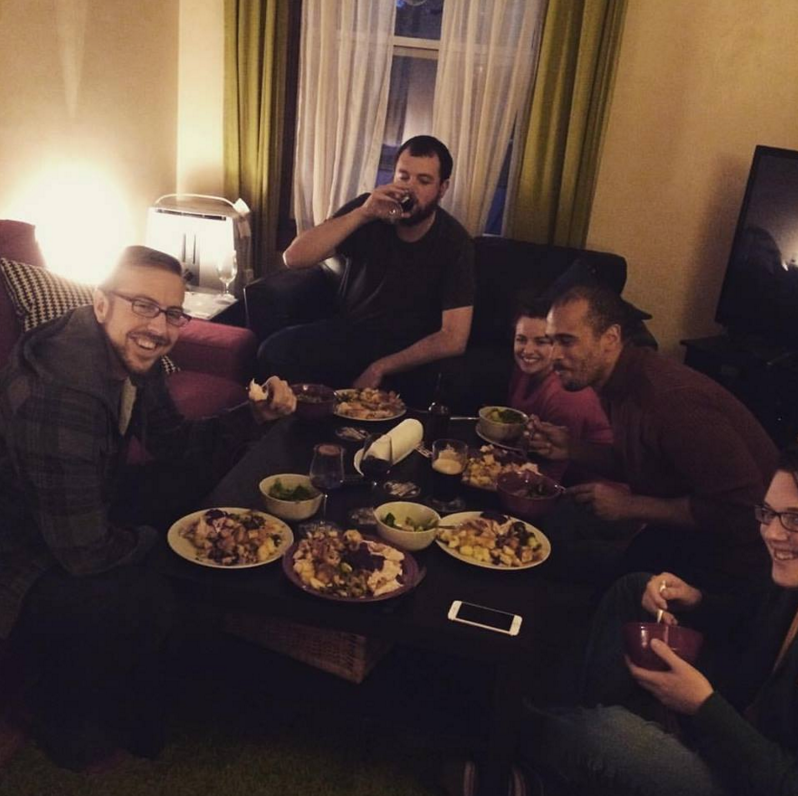
Yesterday I spent my Thanksgiving surrounded by some of the people who matter most to me. We made dinner, had drinks, shared stories, and otherwise enjoyed each other's company. It was a terrific way to wrap up the long weekend, and I'm still glowing just thinking about how much fun it was.
This is the first Thanksgiving I've had without my family in a long time, and as we move into a season where, traditionally, we spend more time with our families, I wanted to talk a little bit about creating a Family of Choice, and how it's helped me.
Some backstory
For those of you new to this blog, I haven't communicated with my parents since last winter. Shortly after the new year I decided to seek out therapy and to start to work through a variety of anxieties and issues related to self-worth that were the result of my relationship with my mom, and one of the things my therapist suggested was to take some space from my mom while I focused on healing.
Needless to say asking for space didn't go over very well, and the fallout was that now neither of my parents speak to me. As a result I don't really speak to any of my extended family, and have very limited contact with my two younger siblings.
I don't talk about it very often because it's a difficult topic to discuss; most people have pretty solid relationships with their families, and even the ones who have rocky ones generally maintain some level of contact with their families despite regular drama and other issues that families deal with.
On being 'No-Contact'
I think that one of the hardest things that adults face is whether or not we should keep negative people in our lives. For many of us, there's that one relationship that we know we shouldn't maintain, but we do so because (often) we feel guilty about not maintaining it.
Think about that one "friend" who you don't really like, but always get invited around because they've always been there, or that family member who you despise but still invite to Christmas because you "have to."
Stop the madness! You never "have to" do anything that upsets you or makes you feel uncomfortable.
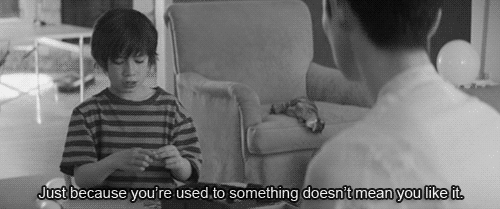
If someone is making you feel bad, guilting you, or otherwise upsetting you on a regular basis, you don't have to include them in your life. Getting to be a part of your life is a privilege, not a right.
For example, I have a family member whose way of "helping" was to challenge me on every single thing I did - I shudder to think about the hours I spent defending all of my decisions, from who I was dating, to my career choice, to where I wanted to go on vacation. It was insanity! I'd see their name pop up and my blood pressure would rise just thinking about the argument that was going to ensue.
If someone in your life is making you feel this way -your parent, friend, colleague, whatever- you have a right to ask them to stop. If they respect you, they will. If not, then it's okay to not politely explain why they don't get to be privy to your life and decisions anymore.
Creating a Family of Choice
"Family of Choice" is just what it sounds like: the people you choose to have around you in your life, and who are close to you. These people differ from your "Family of Origin" which are your blood relatives; mum, dad, siblings, etc.
I've heard lots of people make comments like "friends aren't the same as family" which I think is total BS. I really feel like many of us use "they're family" as an excuse to put up with meddling, guilt, and other nonsense that we wouldn't otherwise put up with from anyone else. How insane is that?
Being blood relatives doesn't (and shouldn't) make maintaining one relationship more important than maintaining others, and just because someone isn't related to you by blood, that shouldn't diminish the importance of the relationship.
Being close to your Family of Choice is just as good as being close to your Family of Origin, if your situation permits it - there's no law stating that just because you weren't born into the same family, that you can't care about someone the same way you would a blood relative.
Creating and cultivating my Family of Choice has been a really important part of navigating this whole No-Contact experience for me. Knowing that I have a handful of close friends whom I can turn to in a crisis helps alleviate feelings of loneliness or isolation which I occasionally feel when thinking about my present circumstances.
In addition to being a support system, a healthy Family of Choice can also serve as a benchmark for other relationships in our lives. Why would we want to spend time talking to or putting up with people who make us feel bad, or tear us down, when we have a support system of great people we can reach out to instead?
Why does all of this matter?
 It matters because we have a right to be happy, and to surround ourselves with kind, positive people who care about us and want to see us succeed.
It matters because we have a right to be happy, and to surround ourselves with kind, positive people who care about us and want to see us succeed.
Most of the time this is pretty easy to do; lots of us are lucky enough to have defaulted into families who are supportive, and manage to find great friends, partners and colleagues whom we care about, and who want the best for us, as well.
However, it's easy to start to fall into the habit of allowing negative people to start to infiltrate our lives, and to start giving them too much weight and authority over our thoughts and our actions. This can be especially true if we've grown up in a family, or have that one family member, who makes us feel like shit. We put up with it because we're used to it.
Creating a Family of Choice means that you get to choose the people you want to share your life and experiences with. It means taking control over your own happiness, and ensuring that everyone who touches your life does so in meaningful and positive ways.
I didn't write this post to encourage you to cut out your family or anything like that, but I wanted to write something to let you know that we can look to outside sources (friends, partners, colleagues, mentors, etc) to help us feel fulfilled and loved. It's hard, and it's a weird process, but it does work and it's worth doing if you aren't getting the supports that you need from your Family of Origin.
We all have the tools at our disposal to build the kind of families and lifestyles that we want to have - what that looks like is entirely up to you.
Have you ever struggled with letting go of a difficult relationship? Was it a friend, family, or loved one? Tell me in the comments, or if it's too personal, send me an email - I'm always available to chat.
How to Stay Connected as a Busy Couple (Plus an Exciting Giveaway!)
- by Alyson Shane
When you're in a long-term relationship it can be easy for the magic to fade away. Conversations rife with sparks eventually become lacklustre discussions and you find yourself spending more time less time lookin' fine and more time in that baggy old ugly T-shirt you got from your work several years ago (team building exercise '99!)
Staying connected can be enough of a challenge for most couples, but when you're trying to maintain a healthy, happy relationship while also balancing a crazy professional career, side projects, spending time with friends and family, and all the other good stuff that comes with being a responsible, driven adult, it can seem even more taxing to spend time keeping your relationship kickass.
Since the past few months have been such a whirlwind for both John and I, I figured I'd take a moment on a laid-back (almost) long-weekend Friday afternoon to reflect and share some insight into what's worked for us so far:

Learn Your Love Language
A few weeks ago I was browsing Reddit, and I came across a thread where one of the posters talked about couples' "love languages," and how understanding how both parties in a relationship express their affection is a key component to you both feeling loved.
Here's an example: I like to clean, and one of the ways that I demonstrate my love is by taking care of chores like laundry, dishes and etc which I know John doesn't like doing. I show my love by making his life easier. John, on the other hand, shows his love by telling me every day, singing songs to me and holding my hand, giving me hugs, being silly, etc.
Many people in my situation would just assume that he's lazy, or doesn't care about helping me, but what's actually going on is that I'm basing my expectations for his behaviour on how I behave, not how he behaves. It's important to understand and recognize this distinction.
When we take the time to understand how both parties express their love it makes communicating a million times easier, and nobody feels neglected or put-out by their partner's behaviour.
The test I'm talking about is called The 5 Love Languages and you can take it here.
Practice Active Listening
When the day is over and both your heads are swimming with information from your respective busy days, it can be tempting to want to zone the hell out and not dive into a deep discussion. However, it's important to ask your partner how their day went and actually listen to the words coming out of their mouth.
It can be tempting to nod your head and give the token "yeah, that's good" reply, but (spoiler alert) people can tell when you're placating them, and it's pretty disrespectful to your partner to tune them out while they tell you about what happened that day.
The best way to avoid the classic "mmhmm, that's nice dear" reply is to practice active listening. Active listening is when you listen to someone and then reply by repeating back what you've heard, either by re-stating or paraphrasing what you've heard in your own words.
Not only does this show your partner that you give a shit about what they've said, it also helps clarify the message and meaning, and make sure there's no confusion.
If you're feeling overwhelmed at the end of the day (as I sometimes am) it's totally okay to say "hey, I need some mental downtime, can we chat in a bit?" and then go for a run, or take a bubble bath, or read, or whatever you need to do to de-frag your brain. As long as that communication is there and your partner feels listened to and valued, that's what counts.
Schedule Some Downtime
One of the most difficult things for super-busy couples to manage is getting some freaking downtime. When you're both managing extremely demanding careers, going out to events several times a week, working on side projects, and maintaining a social life, it can be extremely difficult to find time to just hang out.
Admittedly, I really struggle with having "downtime" which doesn't really help. My idea of downtime is usually doing projects around the house, writing, or doing other things that need doing.
Sometimes though, you have to set aside some time and just hang out with each other and enjoy each other's company. This could mean anything: read books together, watch a movie, make dinner, play video games... whatever classifies as "downtime" for you, do that and do it as often as you can.
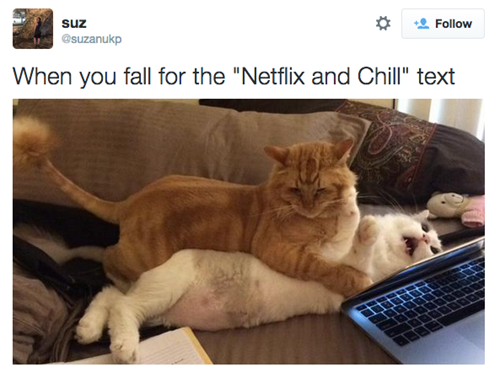
Hook Up (aka "Netflix & Chill")
I don't want to get into too much racy stuff here, but staying physically connected is such a huge part of any romantic relationship, and unfortunately it's one of the first things that seems to evaporate the second couples start to get overwhelmed in other areas of their lives.
I've experienced this personally, and can attest to the fact that when your physical relationship starts to wane, eventually so too does your attraction to your partner, and eventually any romantic interest you may have had goes away as well. At that point you might as well call it quits because you're basically just friends at that point (or roommates, if you live together.)
So the next free evening you have available schedule some time with your partner put on a movie that you've both seen a million times before (you know the one) and "chill."
Plan Dates
When you're busy almost every night of the week it can seem impossible to figure out when to make the time (or the effort, really) to go out for a real, legitimate, you-and-your-significant-other date but it's so, so important.
Courtship is crucial to maintaining all that other good stuff I talked about earlier in this post. Courting isn't just about showing up with flowers (though that helps), it's about putting in the effort, making plans, dressing up and going somewhere spectacular where you have an amazing time together.
We should always strive to be 'dating' our partner, no matter how long we've been with that person.
One of my favourite dates was the day last summer when John and I biked to Assiniboine Park and explored the zoo together. We packed a picnic, a bottle of wine, and the book we were reading together and had a tremendous afternoon.
Do John and I have any dates planned in the near future? I'm glad you asked! Besides going to Gogol Bordello for my birthday (OMG!) we're going to be checking out Mahlerfest, presented by the Winnipeg Symphony Orchestra.
Even better, the good people at the WSO have given me an additional pair to give away to one of my readers!

Here are the deets (via the Winnipeg Symphony Orchestra website)
MAHLER’S 10TH: THE LAST WORD
At the time of his death Mahler had completed two movements of his Tenth Symphony and sketched the remaining movements. A performing version was made by Deryck Cooke: “A masterpiece of reconstruction,” Neville Cardus wrote in The Guardian, “sounding the voice of Mahler and of nobody else.” We are proud to present a WSO premiere, hosted by the eminent writer and Mahler scholar Norman Lebrecht.
This performance also features a Viennese-style masquerade following the performance, which the audience is invited to attend.
Want to win tickets to Mahlerfest? Of course you do!
Here's how you do it: leave a comment and tell me about your favourite date.
It could be anything - maybe you went skiing and sipped hot chocolate together; maybe you went to the library and left Post-Its in all the books you've read; maybe you skipped stones on a pond and made out beneath a huge oak tree. Whatever! I want to hear it!
I'll be choosing a winner by October 26th, which gives you plenty of time to dig through your box of memories as well as make sure your calendar is clear on the 31st.
Good luck!
Live Your Daydream: How to Make a Living Doing What You Love
- by Alyson Shane
Things are starting to ramp up over here at Shaner HQ and lately it seems like I've been getting inundated with people asking me for advice on how to make the leap from boring office job to the exciting (and mildly terrifying) world of running your own business.
While I love talking to everyone individually (I'm a huge chatterbox) it seems like a lot of the same questions keep coming up: how can you figure out what to do? How can you get from 9-5 to full-time business owner? What are the challenges along the way? and so on.
So it seems best to address them in the best way I know how: a blog post, of course!
This isn't going to be a bubblegum session where we talk about the magical dream that is running your own business (though it is pretty kickass); today I want to talk to you about the real-life things that you need to do to start doing what you love for a living.

Figure out what you want to do
So you've got a full-time job that doesn't excite you and you know that you want to run your own business instead, but where the heck do you start? First, figure out the thing that excites you the most and focus as much of your time and energy on learning as much about it as you can.
Maybe you love writing and want to be a copywriter, maybe you love building websites and want to help people build websites for their businesses, or maybe you love knitting awesome sweaters for your cat. Who knows. What matters is that you love doing it, it excites you, and you're dedicated to turning that passion into your livelihood.
The best (and safest) way to start working towards your goal of being a full-time businessperson is to start small. Spend a few hours a week honing your craft, reach out and try to get to know influencers and other people who might be able to help you, find a mentor if possible, and try to gather a small roster of clients.
By having a few clients on the side you can safely get a taste for what your full-time work will be like, start to understand the ins and outs of client relationships, and spend some time thinking long and hard about whether or not these experiences are indicative of the kind of lifestyle that you want to have.
Start to plan
So you've spent some time learning, testing the waters, and have decided to make the plunge into the crazy world of running your own business. Good for you! But before you go quitting your 9-5 all willy-nilly, you need get your ducks in a row first.
Take a step back from your life and look critically at where you are: where are you working? Do you like where you work, and how long are you planning to work there? Do you have any debt, and what are your goals for paying it off? What are your basic costs of living? You get the idea.
Next, sit down and prioritize your goals. For me, my biggest goal was to have as much of my Visa and my student debt paid off before I quit as possible. I made the decision to leave my job in December of 2014, and I spent the next several months working full-time, collecting clients on the side, and using the money that I was making as a freelancer to aggressively pay off my debt. Being able to tackle this huge weight gave me some breathing room when I finally started running my business full-time, and I wish I could go back in time and high-five my past self for being so forward-thinking. I really did myself a solid.
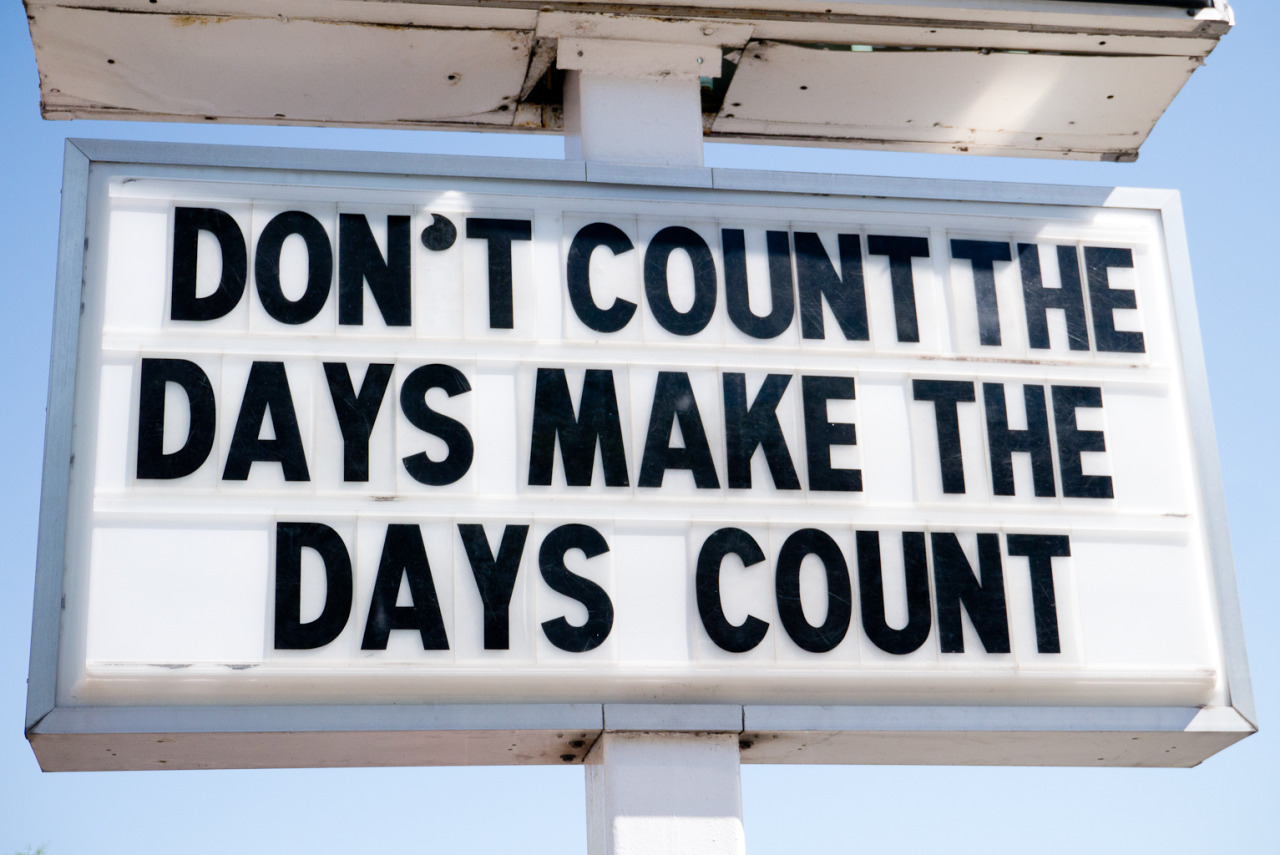
So is there something that you'd like to accomplish, or start doing before you start running your own business? It doesn't have to be debt-related; it could be anything from taking that amazing trip, to buying that new laptop, to meeting with a financial advisor. Whatever it is, do your best to do it before you go solo, because you're going to want to hit the ground running.
Now is also the time to start thinking about the details of your business. By having a deep and thought-out understanding of who you are, what you offer, and the kind of business you want to run before you get going full-time will save you a lot of hassle down the line, and will help you stay laser-focused on your goals.
Some questions to ask yourself are:
- What specific services will I offer?
- What is my ideal number of clients?
- How much will I charge for my services?
- What kinds of contracts do I want to have (eg: recurring, one-time, etc)
- What is the basic monthly income that I need in order to survive?
- How will I find new clients? (eg: blogging, online promotion, Meetups, etc)
- How much money can I save before I quit, and how much runway* will that give me?
*Runway refers to the length of time that your business can exist without collecting any additional sources of income. So, if your client pool dries up, how long until you need to go back to a 9-5.
You get the idea. There are tons of other questions that you'll need to ask yourself that are more specific to your circumstances, but these should get you started.
Treat your goals like recipes
What I mean by this is do everything one step at a time. It can be totally overwhelming to look at all the things that you want to do, or that need to get done, and start to freak out internally because how the hell are you ever going to accomplish all that? By breaking it down, that's how.
Think about your biggest goal and write them down. What do they look like? Do you want to quit your office job by 2016? Be on the cover of your local paper? Land that dream client you've always hoped to work with? Write it all down in as much detail as you can think of.
Now that you've written it down, plot out all the steps that you need to take to achieve that goal and say them out loud as you write them. It sounds cheesy (I know) but it absolutely works. Seeing the words on the page and hearing your own voice saying them helps make those steps seem more real and attainable.
Now that you've set out your goals and broken them down into smaller, attainable steps, it's time to start chipping away at them.
Don't freak out when your plan goes awry
Remember how I said that I had those lofty goals of paying off all my debt before I became a full-time businesswoman? Yeah, that didn't happen. I've made a significant dent, but to quote John Steinbeck: "the best laid plans of mice and men often go awry", and things came to a head at my old job and I had to make an exit before I totally lost my mind. It was a bit sooner than I'd anticipated (by a few months) but by planning ahead and actively working towards this goal for several months beforehand I was in a much better position to start kicking ass and taking names right away.
Remember: just because your plan didn't execute perfectly doesn't mean you fucked up. It means you're human, and it just means that you have one more challenge to face (and overcome!) on your road to independent businessperson fabulousness. Do your best to plan what you can as far in advance as you're able, and when life tosses you a curve ball, you'll be ready to react.
Plan for the best & prepare for the worst.
Be honest with yourself about money
#RealTalk time: running your own business doesn't mean you'll be swimming in giant pools of cash mo-nay immediately. In fact, for most people it takes a long time, sometimes years, to start to really pull in a significant amount of income. Most of us, myself included, take giant pay hits, sacrifice our social lives, travel plans, and long-term goals like home ownership or even having a car because we want our runway to last as long as possible.
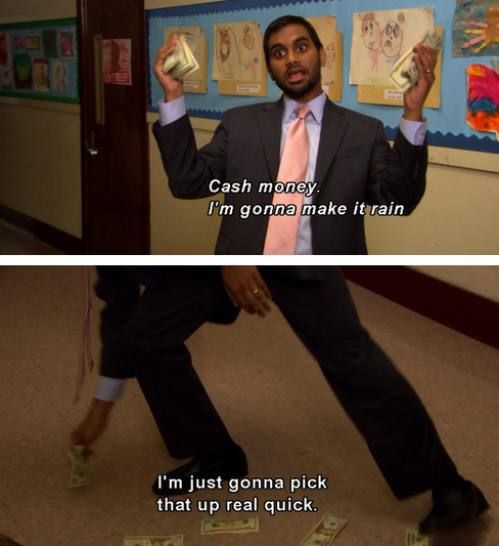
(this is an accurate depiction of what running your own business feels like)
If you've been smart and saving up, or you've got a big cash influx from a contract (or both, if you're lucky) for the love of god don't spend it all at once. I know how good it feels to look at your bank account and see all those dolla bills sitting there, but working for yourself is much more precarious than a 9-5. With a regular job you know you have income coming your way every two weeks (or whatever your pay schedule was) because it was on a schedule, so who cares if you spend a bit extra this weekend - you know exactly when the next influx of cash into your bank account is going to be.
Clients don't usually work that way, and it's not uncommon to wait several weeks for a payment, or for contracts dry up overnight. This is why keeping that runway as topped-up as possible is crucial.
Pound the pavement 24/7
I mean it. When you start running your own business the amount of contact that you need to have with other people (aka "exposure") needs to ramp up significantly. If you weren't active on your own blog, social media feeds, and out and about in your city, it's time to start putting yourself out there.
Believe me when I say this: the amount of work that you put into making sure people know who you are will have significant long-term benefits. It might take some time, but if you can start to develop a positive reputation as being "in the know" about your industry, people will start to defer to you, and eventually will start to refer you to others.
Last year I at one of my speaking engagements I mentioned that I'd been blogging for over a decade, and that experience is what helped me land the role I had at the time. I was speaking to first-year Creative Communications students, and one of them asked "why should I keep my profiles updated when I'm not looking for a new job?" My response to the student was "you never know when an opportunity will find you," and to that I'd like to add that when you run your own business you are always looking for a new job. Ideally you'd like to get yourself to a position where you're turning down work, but until you get there (and if you get there) you need to be as active at promoting yourself and your business as possible.
Ignore the haters
Like the old saying goes: haters gonna hate, and I guarantee you that from the second you mention that you're planning to start your own business there will be someone naysaying the idea right from the get-go. It might be a colleague, friend, family member, whoever. They might put down or dismiss your goals, and will likely do so under the guise of "being concerned" and "caring about your well-being." If anyone in your life says that to you, make a point to respond by saying "if you're concerned about my well-being, then help me achieve this goal because it will make me happy."
Remember: what you're doing takes guts and courage, but it's something that anybody can do if they just work hard enough. There will always be reasons and excuses to not pursue your dreams, and the longer you wait the more you'll begin to sound like everyone else.

Do any of these phrases sound familiar?
"This job is as good as things are going to get."
"I don't have the time"
"I could never make money doing what I love"
"I have too many responsibilities and it's too late now"
I grew up hearing all sorts of BS like that, too. My dad has worked in the same department since his early twenties, my mom never went to college, and growing up I was surrounded by people who simply settled for their lot in life and never tried to push themselves (though man did they ever bemoan their circumstances.) These influences led me to believe that running a business was this unattainable and foolish goal, and something not worth pursuing.

If there's anyone in your life echoing similar sentiments, tell them where to shove it. Life is too short to spend waiting around for the perfect time (which will never come) or trying to please everyone (which will never happen.) Here's a great quote on the matter:
“In every industry, there is an edge. In your business or personal life, it doesn’t matter– somewhere, there is a cliff. Most people don’t want to get to close to it, because they’re afraid they’ll fall off.
Thing is, the edge is where all the cool stuff happens. I know you don’t want to make a decision that is irrevocable and wrong– a decision from which you might never recover– that’s natural.
But guess what?
You are actually in the middle of an open field, inside your house, clutching your purse, crying like a little girl while looking at an edge you see on television.
In other words? You are nowhere near the goddamn edge.
It’s time you stopped being a fucking pussy.”
Julien Smith
Still feeling stuck? Get some help
If the idea of starting your own business is still way too daunting (and that's totally okay!) here are some great resources, articles, and people I'd recommend working with to help set you on the right track:
How to Do What You Love
An amazing article by YCombinator founder and overall genius Paul Graham
Kyla Roma
Business coach & strategist, and totally badass babe (also someone I know personally & adore)
Futurepreneur Canada
Tons of resources for mentors, coaches, funding options, etc (for Canadians)
Miracle Worker
8 week online course by Gala Darling & Ellen Fondiler
Seth Godin's Startup School
A free podcast series by Seth Godin, world-renowned marketing author, thinker and overall clever dude
Moz Learn
Learn everything there is to know about inbound marketing with this series (which I highly recommend)
Still have more questions about running your own business? Want me to expand on any of these topics? Shoot me an email, tweet at me, or let me know in the comments!
In My Community: the CEO Sleepout + why it matters to me
- by Alyson Shane
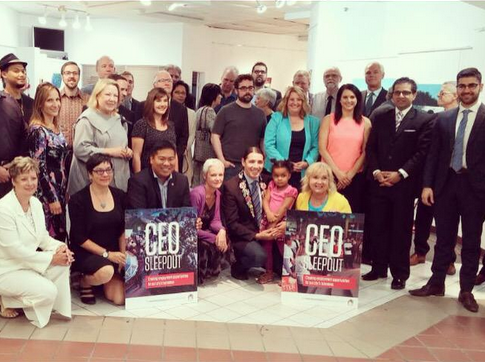
Yesterday I attended the press release for the 5th annual CEO Sleepout, organized by the Downtown Winnipeg BIZ.
The CEO Sleepout, which is in it's fifth year, aims to create employment opportunities for Winnipeg's homeless community, and to create dialogues among over 150 CEOs, community leaders, and media about our role in addressing and eliminating homelessness in our city. In the past four years the Sleepout has raised over $600,000 from the private sector, which has helped employ nearly 137 people experiencing homelessness for more than 51,000 hours of employment - with many of them returning to school or finding permanent full-time work.
On September 24th members of Winnipeg's business community (myself included) will spend a night on the streets at Portage & Main, discussing issues and possible solutions to end homelessness, touring downtown with individuals who have experienced homelessness to hear about their personal stories, and spending a night outside to experience a small taste of what it's like to be homeless in Winnipeg.
I'm really excited to be participating, and helping to raise money and awareness for this amazing cause.
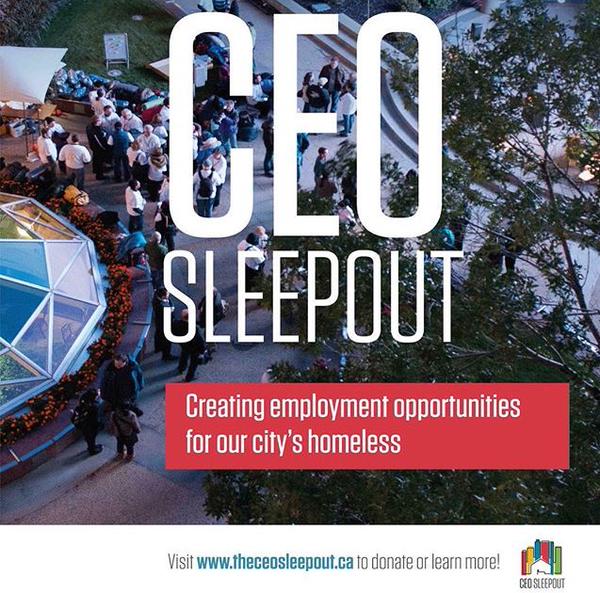
I grew up being quite sheltered. My parents moved me to a suburb called Riverbend when I was a kid, and with downtown a solid 45-minute bus ride away, I didn't spend a lot of time in our downtown core as a young person. I'm pretty embarrassed to admit this, but the first time I spent any time in the Exchange District was at 18, and I spent the entire time gripped with fear that a homeless person would accost me and take all my stuff.
Part of the problem of growing up in a suburb is that you develop a very "us vs them" mentality about your own neighbourhood versus the downtown of your city. In Winnipeg, at least, many of our young people (myself included) grow up holding extremely prejudiced and narrow-minded views about homelessness, Aboriginal issues, and individuals experiencing poverty. We don't see the issues that plague people experiencing poverty and homelessness as something that we need to address because we can simply hop in our cars and drive back to our sprawling suburbs, ignoring the problem completely.
I'm fortunate that I grew out of this phase in my thinking. When I moved out of Riverbend I lived in Osborne Village for a year, and then to West Broadway in order to be closer to school (I attended the University of Winnipeg, where the entire campus is located downtown.) West Broadway is one of the poorest neighbourhoods in the country, and living in a mixed-use and mixed-income neighbourhood, and attending a school like the University of Winnipeg which encouraged discussion about the specific challenges that Winnipeg faces in terms of public discourse and action to combat homelessness, was an eye-opening experience.
I started to see Winnipeg, and the people in it, as my responsibility. Living downtown and getting involved gave me a sense of community that I'd never felt while living in Riverbend; suddenly I wanted to see my city thrive and succeed because it meant that everyone -not just me- would get to benefit from it's success. A rising tide lifts all boats, as the old saying goes.
I was lucky: I experienced a specific set of circumstances which allowed me to develop beyond the close-minded views I had been raised with. However, many people in Winnipeg (and elsewhere) still consider homelessness and other socio-economic issues to be something that simply "isn't their problem."
That's why I decided to get involved with the CEO Sleepout. I want to raise awareness about an issue that concerns all of us, whether we live in Riverbend, Wolseley, St. Boniface or Transcona. Everyone in Winnipeg has a responsibility to do our best to make our city a better place to live - for ourselves, our kids, and for everyone else who calls Winnipeg 'home.'
I'll be collecting donations until the day of the event, so please give generously and consider donating your time to help out at local shelters and resource centres like Siloam Mission and RaY: Resource Assistance for Youth.
Ending homelessness won't be an easy task, but by working together and raising awareness we can start to make real change in our city. Let's do it together.
